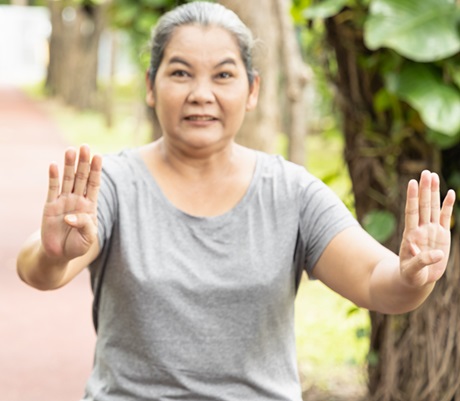Breast cancer, a global health concern, profoundly impacts patients’ physical and psychological well-being. Beyond traditional treatments like surgery, chemotherapy, and radiotherapy, nonpharmacological approaches such as Tai Chi and Baduanjin (a form of Qigong and consists of eight distinct movements) are emerging as complementary therapies with the potential to enhance quality of life, cognitive function, and overall recovery.
A systematic review and meta-analysis published by Frontiers in oncology in October 2024 evaluates the impact of these two ancient Chinese mind-body practices on breast cancer patients.
The researchers analyzed 16 trials involving 1,247 participants (647 in intervention groups and 600 in control groups) using standardized mean differences to measure the effect sizes.

The Comprehensive Benefits for Breast Cancer Patients
1. Cognitive Function
Four studies involving 209 patients found that Tai Chi and Baduanjin significantly improved cognitive function. This suggests that these practices can counteract the cognitive impairments often experienced after cancer treatments.
2. Shoulder Joint Function
Shoulder mobility and strength are crucial for post-surgery recovery. Five studies with 456 participants showed significant improvements in shoulder joint function.
3. Anxiety and Depression
Tai Chi and Baduanjin significantly reduced anxiety and depression. These findings highlight the practices’ role in alleviating psychological distress, a common consequence of cancer diagnosis and treatment.
4. Fatigue
Four studies involving 282 participants reported a reduction in fatigue levels. This is particularly important as fatigue often hampers the recovery process and quality of life.
5. Sleep Quality
Three studies with 222 participants showed improved sleep quality, addressing a critical issue for breast cancer patients.
6. Quality of Life Nine studies encompassing 749 participants revealed a significant enhancement in quality-of-life metrics.
Conclusion
Tai Chi and Baduanjin offer promising nonpharmacological interventions for breast cancer patients, improving cognitive function, physical mobility, and mental well-being.
As complementary therapies, they not only enhance recovery but also empower patients to actively participate in their healing journey.
By bridging traditional wisdom and modern medicine, these practices underscore the potential of holistic approaches in addressing the multifaceted challenges of breast cancer recovery.